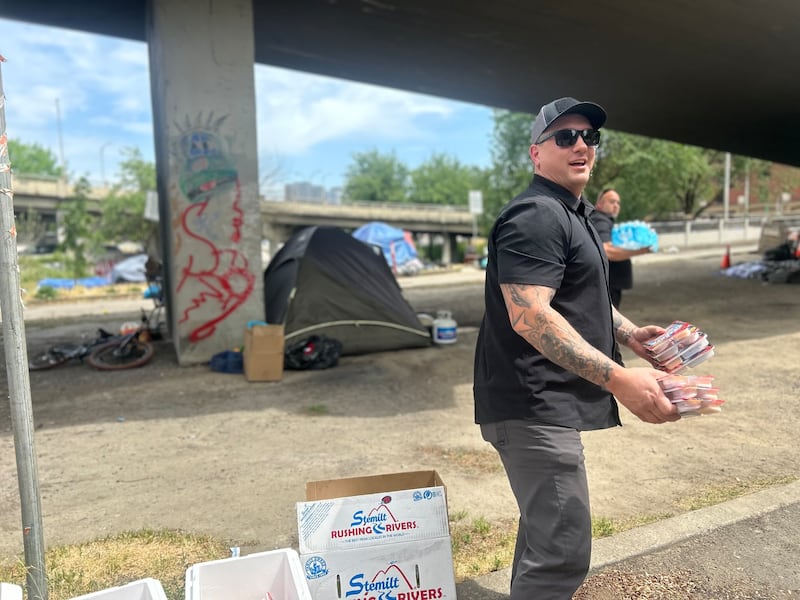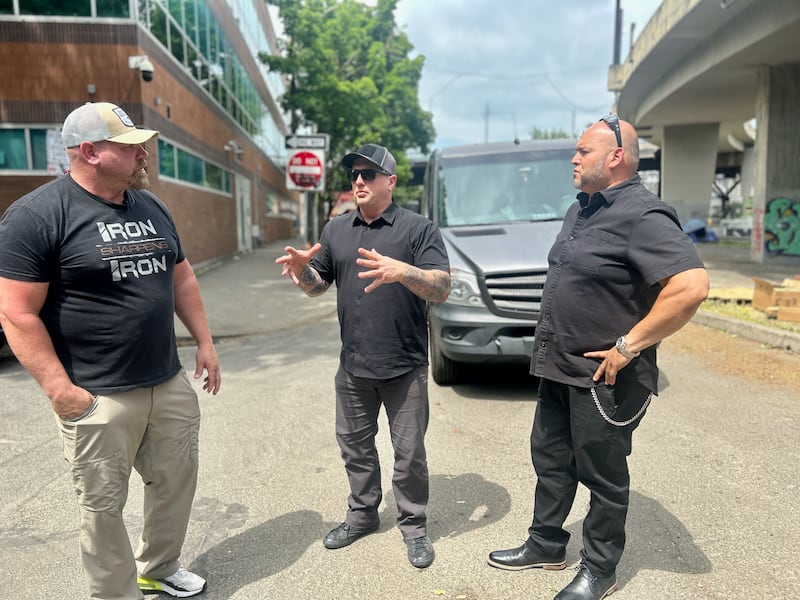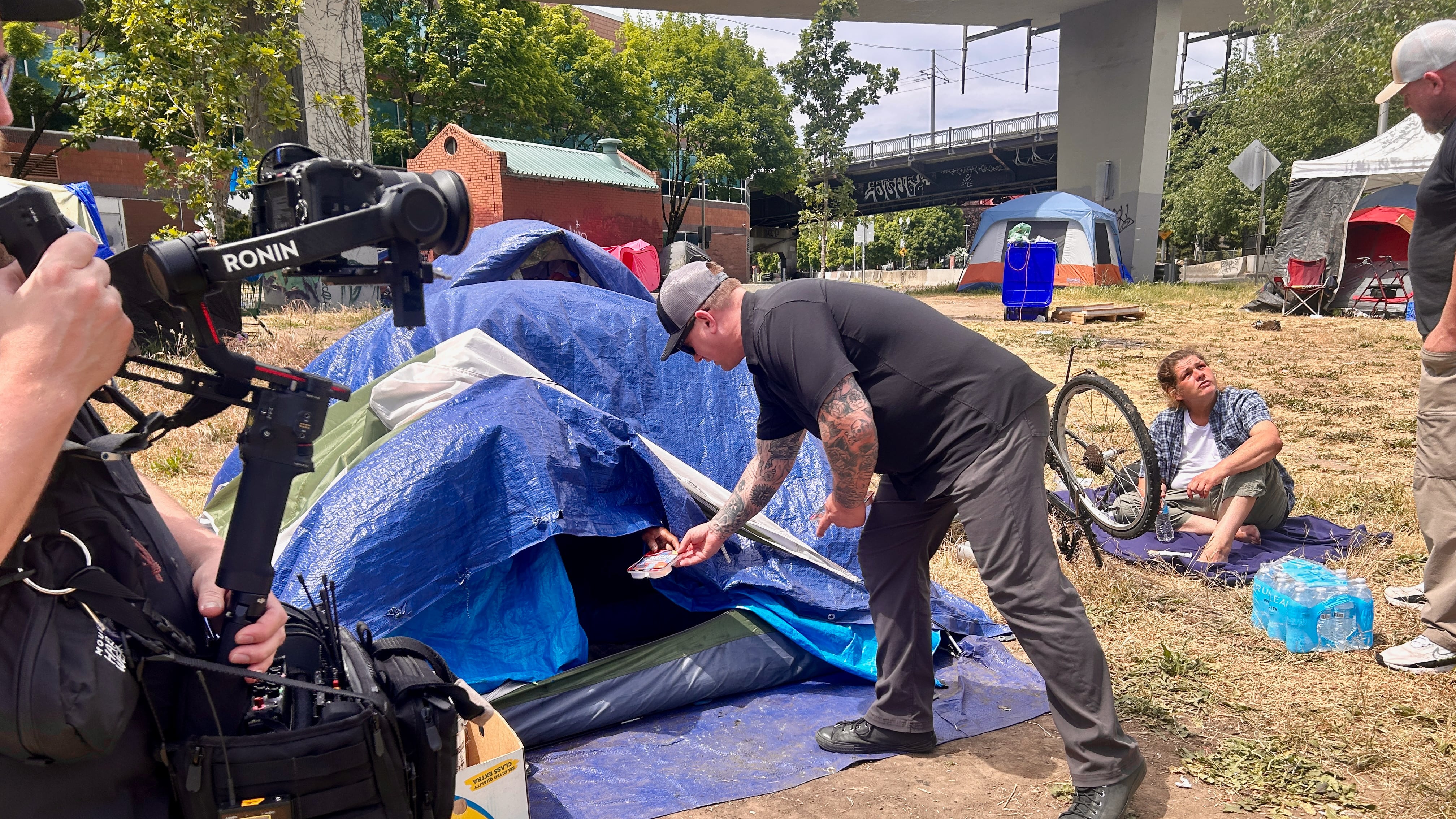A new religious organization has hit the streets of Northwest Portland, offering the homeless food and access to shelter. Barely a year old, it’s already winning public grants, philanthropic checks, and nods from city leaders.
Loving One Another, while registered as a 501(c)(3), is not your typical nonprofit. It was created by Alex Stone, the founder of a private security company, Echelon Protective Services, that supplies armed guards to downtown businesses fed up with sidewalk camping and the crime associated with drug use.
And the nonprofit is helping to win the security company new business, including what might be its biggest contract yet: a $1.5 million deal with Pearl District neighborhood leaders to use both Stone’s armed patrols and his philanthropic outreach workers to address vandalism, theft and drug dealing outside their doors.
Those who support Stone’s efforts say he’s filling a role vacated by the city and county as an understaffed police force recedes and the county’s emergency aid programs fail to address the growing ranks of unhoused people.
“His team are just great people, and they really care about people on the streets,” says Ken Thrasher, a former Fred Meyer executive and chair of a new Pearl District initiative that hired Stone.
City leaders are impressed too. In an Instagram post, City Commissioner Dan Ryan praised its “exceptional work,” citing its claim that it moves 45 people off the street into homeless shelters every month. “We can use every tool in the toolbox right now,” Ryan tells WW.
But not everyone is so pleased to see a private security company moving into humanitarian aid. “This reminds me of those days in the Iraq War when it became clear that Blackwater was doing most of the United States government’s dirty work,” says Juan C. Chavez of the Oregon Justice Resource Center. “The privatization of public services inevitably leads to unaccountable waste.”
Stone has discovered that in the case of downtown camping, the interests of private businesses and public agencies converge. Both want campers to move to shelter, and both are willing to pay through the nose to make it happen. His web of nonprofit and commercial entities allows him to tap both. “When you follow the money,” says Kat Mahoney, head of the Old Town social services nonprofit Sisters of the Road, “it all goes back to Stone.”
Stone says his nonprofit can be more effective than the status quo, and he’s plugging his services to local officials.
“Most people that are in office, they want to make a difference in the lives of people on the street,” he says. “But there’s a lot of things getting lost in translation.”
Both of Stone’s operations are poised to have greater leverage this summer. Starting in July, people camping on Portland sidewalks who refuse shelter will face fines or jail time. That means Stone’s pitch to unhoused people is about to carry greater weight.
To understand what Stone is up to in the Pearl, WW asked Stone to let us ride along. He agreed.

When the WW reporter arrived last week at Loving One Another’s office in the Maddox Building on Northwest 13th Avenue, he was greeted by a production crew. It was the set for Stone’s forthcoming docuseries, Ride Along.
As a showrunner tried to mic this reporter up, Stone explained the premise. “It’s kind of like Cops,” he said, referring to the unscripted TV show. This reporter declined to participate but was allowed to tag along anyway.
Inside the sparsely furnished loft was a production studio. Boom lights, cameras and microphones were aimed at a large Echelon Protective Services logo, which was flanked by military memorabilia backlit in red, white and blue.
Stone’s personal story is central to his appeal among clients. He grew up homeless in Houston, he says, before becoming a cabinet maker and eventually serving as a chaplain at Joint Base Lewis-McChord in Washington, according to a résumé submitted to state regulators. Meanwhile, he was working as a small-town cop across the Columbia River in Oregon.
But his tenure with the Clatskanie Police Department was upended in 2015 when he accused the chief of making racist comments, attracting national headlines. The chief resigned—and then so did Stone. Investigators accused him of repeatedly lying, not about the chief’s bigotry but fabricating other damaging claims about co-workers and the city’s top brass.
In a letter to state regulators relinquishing his law enforcement certification, Stone said he was a whistleblower and had become “disillusioned” with law enforcement. Shortly thereafter, he applied to become a private security guard and started the company that would become Echelon Protective Services.
In 2021, Oregon Public Broadcasting reported that Stone’s client list was a “roster of civic heavy-hitters” paying as much as $16,000 a month for private patrols.
Some have heaped praise on Stone’s services. “We receive regular feedback from folks living on the street saying ‘Thank god for Echelon,’” wrote Jessie Burke, CEO of The Society Hotel, in a 2021 letter recommending Stone’s appointment to a state committee overseeing private security firms. He was appointed last year.
But some have criticized Stone’s business model, citing a lack of oversight. An OPB story published later that year found the company had been scrutinized by police and prosecutors for brutality and illegal sweeps, and quoted Multnomah County District Attorney Mike Schmidt saying he was “disturbed by allegations of misconduct by employees of Echelon.” No charges were filed. Schmidt’s office declined to comment to WW.
A year later, Stone incorporated Loving One Another as a religious nonprofit in Oregon. Stone, who has three academic degrees from Baptist institutions, filed papers in Washington in March of last year registering Loving One Another as a 501(c)(3) nonprofit providing “religious support.” He received tax exempt status from the Internal Revenue Service as a church in December.
As a church, Stone doesn’t have to file financial records with the feds, shielding the financial interrelationships between his various endeavors from scrutiny.
Earlier this year, he added a new customer: the city of Portland, which handed Loving One Another a $5,000 contract—a pittance, by nonprofit contracting standards—to hand out “food, clothes, hygiene supplies” and bus fare along the South Waterfront.
He expanded to the Pearl District, where local leaders created a nonprofit, the Northwest Community Conservancy, to hire Stone to patrol the streets. So far, the NWCC has raised around $500,000 from local businesses and residents. (Condo owners donate $20 a month.)
Right now the NWCC pays Echelon to patrol around the clock with up to three security guards. It plans to eventually spend $1.5 million a year, Thrasher says.
Pearl District leaders considered 10 security companies before going with Echelon. What sealed the deal, Thrasher says, was Stone’s decision to form a nonprofit, which allows his employees to interact with campers in public spaces—addressing prior concerns that its private security guards were overstepping. “Forming [Loving One Another] was a really important thing,” Thrasher tells WW. “It allows them to access places that they couldn’t before.”
The result: Stone has turned street outreach, once the purview of ragtag nonprofits and community organizers, into a thriving business. State records show he now employs around 50 security guards. And, based on incorporation documents filed in Oregon, Washington and Texas, he’s using his cash to expand into media production, home security, and an “artificial intelligence-driven video surveillance system.” (Thrasher says cameras to “monitor high-risk corridors” are part of the Pearl District’s long-term safety plan.)
“You pay a high premium,” says Tiffany Hammer, a member of the Old Town Community Association who helped Echelon win a contract there in 2020. “Pacific Echelon is thriving because they have the respect of the street.”

Outside the Maddox Building, Stone and his team pile into a van and drive down to a section of Northwest Portland at the base of the Steel Bridge known colloquially as “the pit.” It’s where an unhoused man nearly burned to death in a cinder block enclosure underneath an on-ramp. This sunny afternoon, dozens of tents dot the grassy field.
Stone, his former security guard-turned-head of outreach Leif Spencer, and a childhood friend, JJ Arevalo, stroll from tent to tent.
“Alex has a heart for people,” Arevalo explains. A camera crew tails the three giant men as they hand out water bottles and offer rides to a homeless shelter or, in one case, a bus ticket home to family in Florida.
It’s not an easy sell. Nine times out of 10, Stone is rebuffed, but persistence works wonders, he says. “We’re waiting to find people who say, ‘I’m ready.’ If you’re doing this every day, you get 100%.”
A man pulls up on a bike and shakes Spencer’s hand. He goes by the name “Red Dog” and is happy to share his story for the cameras.
Red Dog says he’d never been approached about getting into shelter until meeting Spencer. Now he has a bed, but he’s been waiting for housing for nearly a year. He’s frustrated. In the meantime, he hangs out at the pit.
Stone jumps in to plug his brand of street outreach. “If the county and the city are going to spend millions of dollars,” he says, “it should probably go to the actual tents where the people live.” (On June 13, the county announced a new outreach effort in the pit. Its nonprofit contractor “screened 75 people over four days.”)
The men pause on a street corner by the Lan Su Chinese Garden, an Echelon client. Stone reminisces about a time when the garden drew far more visitors. The solution to downtown blight, Stone explains, is to convince them to come back.
“It’s like the civil rights movement, bro,” he muses. “You get people in the streets, you own the streets.”
Correction: An earlier version of this article incorrectly stated that Echelon Protective Services employed 200 security guards. The correct number was around 50. WW regrets the error.

